The educational journey of a pastry chef through VCC's Provincial Instructors Diploma Program.**This work is licensed under CC BY-NC 4.0**
Don't wanna be here? Send us removal request.
Text
Blog Post on Chapter Six – Experience and Learning
instagram
Chapter Six from our textbook deals with experiential learning theory and is something that I relate to from a training point of view as learning through practice and experience is how the culinary arts is traditionally taught. If we look through the lens of Kolb’s Experiential Learning Cycle, he states that,
“Learning…is the process of whereby knowledge is created through the transformation of experience [1984. p.38]” (Merriam & Bierema, 2014, p. 108).
And according to Kolb, to engage in meaningful learning, learners must engage in the four stages of his cycle: Concrete Experience, Reflective Observation, Abstract Conceptualization, and Active Experimentation.
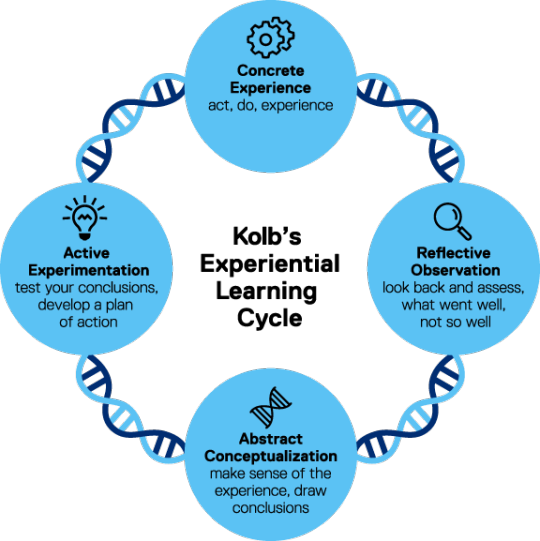
(Photo courtesy of https://www.torontomu.ca/experiential-learning/faculty-staff/kolbs-el-cycle/)
Using a culinary example, if I demonstrate a recipe to my class and then they replicate the recipe in the kitchen lab, they are engaged in a Concrete Experience. The next day, we think about how successful they were in reproducing the recipe and think about what they can do to improve their performances. This is the Reflective Observation stage. Through our class discussions, we decide that the students need to adjust their oven temperatures and baking times and this is Abstract Conceptualization or what they have learned. The following week, when we revisit this recipe in the kitchen lab, the students make the required adjustments and see better looking products, which is Active Experimentation or learning from their experiences.
And in my opinion, the notion of reflective practice is the most important part of the experiential learning theory; when we critically reflect on our experiences, that is when learning with deep meaning occurs.

(Photo courtesy of https://www.bakersjournal.com/a-bakers-path-4739/)
Later in Chapter Six, another section that really resonates with me is the discussion about cognitive apprenticeship. From our textbook,
��“Like traditional apprenticeships in which the apprentice learns a trade such as…culinary arts by working under a master teacher, cognitive apprenticeships allow the master to model behaviors and the thinking that accompanies the task” (p. 119).
In support of this theory, I found an interesting article by Tsui, P.L. & Chen, Y.C. (2020) where they study the satisfaction of hotel workers in their F&B service training under a situated cognition apprenticeship model versus a traditional lecture-only model. They conclude that,
“The current study has experimented with cognitive apprenticeship teaching and has determined that learning satisfaction is enhanced when the master assists during the learning process. Furthermore, the study has also found that cognitive apprenticeship teaching is superior to conventional teaching, which may be because F&B service demands the acquisition of more knowledge and skills in a situated learning environment, wherein the master and apprentice interact and solve problems together. Meanwhile, the learner also acquires F&B skills by following the master’s lead. These factors work together to achieve a higher level of learning satisfaction.” (p.13)
Therefore, this study supports the validity of teaching the culinary arts within a situated cognition apprenticeship model as it creates a more positive learning environment for the students where student and teacher work together to learn from their experiences in a meaningful way. In my evolution as a pastry instructor, I hope that I can utilize this model in my future classrooms and teach my students to become reflective and self-directed, lifelong learners.

(Photo courtesy of https://www.vcc.ca/programscourses/baking-and-culinary/)
0 notes
Text
Blog Post – Chapter Four – Self-Directed Learning

After reading Chapter Four in our textbook on Self-Directed Learning, I find that there are a lot of points that I can relate to. Naturally, being an adult learner returning to post secondary school in an online environment, there will be a lot of self-directed learning (SDL) involved within the structure of our course, but it is my 20 years as a pastry chef running my own business where I feel the affiliation with SDL.
From the opening paragraph of Chapter Four (Merriam & Bierema, 2014, p.61), “your project was [SDL] if you: intentionally sought the learning, planned your learning, took responsibility, controlled your learning, and evaluated the outcome.” All these markers describe my continuous goal of learning how to make gumpaste flowers.
When I started my business, wedding cakes were a major focus as my goal was to become one of the leading bespoke wedding cake artists in Vancouver and to excel in the industry by making all of our cakes 100% from scratch; from baking the cakes to making the fondant and decorations too. But making gumpaste flowers is an advanced cake decorating skill that is barely touched on in cooking school, so I had little experience with them.
“Intentionally sought the learning”
After taking a basic gumpaste flower course at a local cake decorating shop, I decided to fly to Atlanta, Georgia and participate in a 5-day comprehensive gumpaste wedding cake flower course at the International Sugar Arts Collection (https://www.nicholaslodge.com/), a sugar crafting school founded by my mentor, Nicholas Lodge (1961/2022).

(Photo courtesy of https://www.nicholaslodge.com/blog/nicholas-lodge-s-new-blog)
“planned your learning”
After learning the basics of making 10 different flowers and foliage, I had the opportunity to see Nicholas again when he taught a few different classes in Vancouver and as a team building exercise, I brought my entire staff to learn from him as well.
instagram
“took responsibility and controlled your learning”
With these basic skills in hand, I would be challenged continually over the past 17 years to create different types of gumpaste flowers at the request of my brides. By contacting Nicholas over the years for instructional sheets and by doing my own research with Google, YouTube and a couple of renowned sugar flower books, I learned how to improvise with the flower cutters I owned and to not spend too much money on every flower cutter and impression mold in existence! As well, I learned to adapt techniques for making one type of flower to new ones.
instagram
“evaluated the outcome”
As per trial and error, the first few flowers would not be that great, but I always make more flowers than needed to be able to choose the best flowers for my wedding cakes and with the positive responses from my brides, I think I have done okay!



With some reflection on methods and looking at the context of my experiences, I know that I can keep improving my techniques and I was able to self-direct my learning into something meaningful that gives me the confidence to continue learning as a pastry chef and evolving my cake decorating skills for the better.
0 notes
Text
For anyone interested in listening, here is my Cognitive Science podcast assignment on the Testing Effect. The author of the article does some detailed research and study into the effectiveness of the Testing Effect and it's benefits to memory retrieval as I discuss some sample exercises that I could introduce into my future classroom.
Here is the reference to the article in my podcast:
Rivers, Michelle L. (2023). "Test Experience, Direct Instruction, and Their Combination Promote Accurate Beliefs about the Testing Effect". Journal of Intelligence, 11(7),147. https://doi.org/10.3390/jintelligence11070147
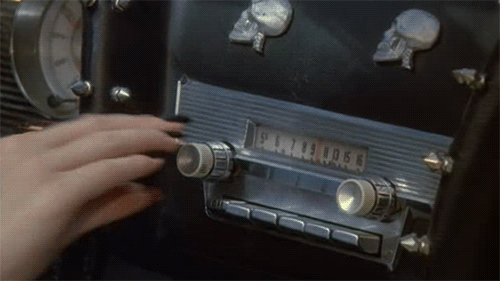
0 notes
Text
Blog Post – VCC School of Education Facebook Page
Being enrolled in at VCC and being an adult learner, learning how to learn again, there are days I wish studying could be this easy….

Anyways, as I couldn’t figure out where to post this link in my other posts, I’m making this special post to let people know where to go to find out more information about our program.
https://www.facebook.com/VCCSchoolOfInstructorEducation

(Photo courtesy of https://www.vcc.ca/about/college-information/careers/careers-at-vcc/)
So far, this introductory course has been interesting, and has given me a lot to think about how I would like to structure my future classroom. There are parts of humanistic learning theory which speaks to me and more specifically, experiential learning and self-directed learning. But coming from a culinary education background where most programs have been structured and taught the same way for hundreds of years, I look forward to learning how best to incorporate these ideas into my classroom.

0 notes
Text
Blog Post on Chapter Nine: The Brain and Cognitive Functioning – A Quick Thought and an Article on Stress and Learning

(Photo courtesy of https://k12.thoughtfullearning.com/FAQ/what-are-social-and-emotional-needs-brain)
The parts of Chapter Nine in our textbook that I initially connect to is the biological aspects of cognitive function and how it relates to learning. As I have a bachelor’s degree in science, the terminology and functions of the different parts of the brain and it systems is familiar to my past studies and evokes a bit of nostalgia. But then I found an article by Susanne Vogel & Lars Schwabe (2016) titled “Learning and memory under stress: implications for the classroom” which discusses the relationship between stress and memory retrieval and memory formation, i.e., learning and how teachers may be able to accommodate that dynamic in the classroom.
Their introductory chapters focus on the biology of how different neurotransmitter chemicals released after stress events, affect the brain and as a result, memory formation and retrieval. I found this part fascinating as learning can be studied on such a scientific microcellular level and explained by the activation or blocking of receptors in different parts of the brain and being able to test these hypotheses empirically. They summarize that, “stress affects memory in a time-dependent manner, often enhancing memory formation around the time of the stressful encounter but impairing memory retrieval and the acquisition of information encoded long after the stressful event. These effects depend on interactions between [noradrenalin] and cortisol in the amygdala and are thus often stronger for emotional than for neutral learning material.”

Later, they talk about the implications of stress in the classroom and how both teachers and students are affected by stress. Vogel and Schwabe state that “[c]onsidering this wide range of possible stress effects in educational settings, strategies to deal with stress and its consequences are needed. First and foremost, teachers should be aware of the impact stress may have on memory formation, retrieval and updating. Moreover, students should be educated about the influence of stress on memory to raise awareness for the powerful effects stress may exert and the need for efficient coping strategies.” As a future educator, the fact that stress impacts learning in the classroom raises a lot of questions like “How will I accommodate stress in my classroom to help my students learn better?” or “How do I mitigate circumstances when a highly stressful event occurs during my class?” or “What can I do to not let my own stress affect my classroom?” This is definitely an interesting topic that requires more thought and contemplation.
0 notes
Text
Blog Post #3 – Assignment #4 – Roles and Trends Discussion with my Learning Partner
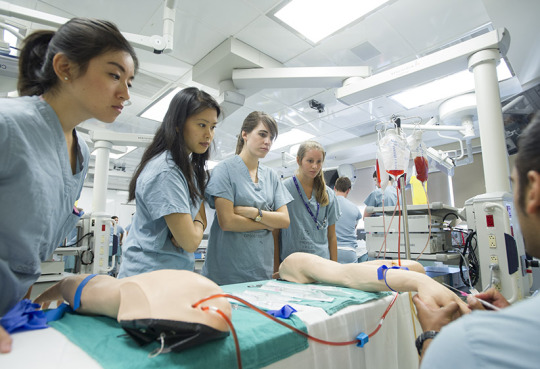
(Photo courtesy of https://macleans.ca/education/top-10-nursing-universities/#gallery/macleans-2016-university-rankings-top-10-nursing-programs/slide-1)
Last week I had a great conversation with my learning partner Matthew about some of the trends in education and in our fields of study. Matthew is a working nurse (LPN) and currently a full-time student at VCC taking the Advanced Early B.Sc. in Nursing and PIDP is one of his electives. One of the major trends in adult education that is most relevant to him is Artificial Intelligence as it is an issue that he and his classmates discuss and that he admits to using as a prompt to help kickstart ideas for writing his papers. As I have not used any AI programs before, he explained the process to me and what positives exist and the fallacy of relying on AI to do 100% of the work. Predictably and inevitably there will be factual errors and/or technical errors where the AI does not comprehend the context and usage of technical verbiage and any student that relies on AI will be at risk of plagiarism and inaccuracies. But Matthew also tells me that some instructors have also looked to AI for help to evaluate student papers and homework and that seems kind of ironic to me.

(Photo courtesy of https://veracitiz.com/blog/impact-of-artificial-intelligence-on-intelligent-automation/)
Other topics we touched on included the traditional model of apprenticeships in culinary education and how online learning was growing; the introduction of micro-credentials which allows for chefs and cooks to take online courses and earn degrees to improve their employment opportunities; and hybrid learning growing in popularity as an outgrowth of online learning, post COVID-19.
Our last discussion topic impacts both culinary and nursing programs where enrollment has been dropping noticeably. For Matthew, this trend is acute and depressing as the shortage of nurses in British Columbia and Canada affects him personally. The trend started pre-COVID but has continued to decline in recent years. In culinary, there is also a shortage of chefs, cooks and workers in the food and beverage industry, and it is not difficult to find employment if you are willing to do the work.
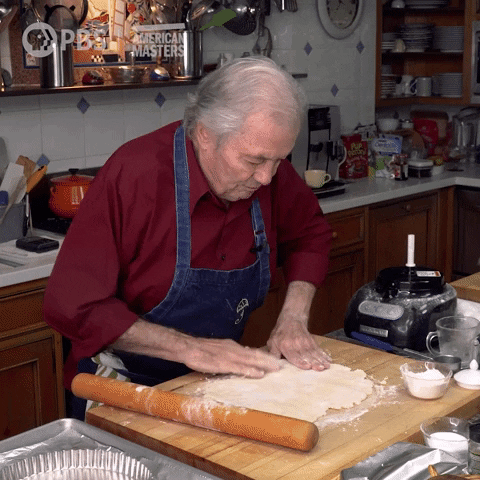
In my opinion, that is one part of the problem. The work. Or to be more accurate, the expectations of what the work will be. Working in F&B is not as glamorous as reality television shows make it out to be and there is a lot of hard work and long hours involved and it is not the type of work to get rich quickly. With many culinary and pastry graduates receiving a dose of reality when they enter the workforce, it is not surprising to see many of them leaving the industry after a few short years or just deciding to make it a professional hobby instead. Unless you love what you do, that is, you love cooking and you love baking and you love serving others and making people happy, then working in the food and beverage industry is not for you. Speaking from experience, being a chef or being a pastry chef is a passion and passion is the thing that drives us to become lifelong learners and strive to be better everyday.
0 notes
Text
Blog Post on Chapter Three: Andragogy – An Interesting Article I Found

In the course of my research, I came across this interesting article by Nisreen Abdulsalam (2015) which explores culinary arts education and the use of andragogical learning theories in her study.
https://tigerprints.clemson.edu/cgi/viewcontent.cgi?referer=&httpsredir=1&article=2502&context=all_dissertations

The main motivation for Abdulsalam’s study is to promote the benefits of sodium-reduced cooking and menus to future chefs. Therefore, she designed her study to look at the effectiveness of different teaching methods including experiential learning techniques and online learning by surveying students who attended classes in person and online. Abdulsalam explains…”part of this research was looking to integrate best practices in teaching and learning as relevant to advancing culinary students education and to determine which teaching strategies and learning theories can be used with culinary students for applied nutrition training programs.” She then talks about specific learning theories. “To maximize learning outcomes for adult culinary arts students, experiential learning should rely on sound andragogical principles. The use of an andragogical theoretical approach in the form of the experiential learning strategy in teaching and learning can be seen in a study…[of] the efficacy of an online-based learning for culinary students and [it was] found that the key to engaging adult students was to teach them what they wanted to learn, rather than following some kind of a predetermined plan.” Other strategies she mentions includes self-directed learning, group learning and motor learning,
By adapting the above-mentioned theories to online learning, she describes a theory that I had not heard of before but seems like something that will be of use in my future classes. Abdulsalam writes, “The theoretical framework guiding this application is cognitive theory of multimedia learning. This theory applies a foundation of experiential learning theories to online learning (Mayer, 2005). The assumptions of a cognitive theory of multimedia (CTM) include the following: (1) assumption of dual channels, (2) assumption of limited capacity, and (3) assumption of active processing. The assumption of dual channels assumes that when both auditory and visual processes are stimulated, learning is improved. Hence, it is better to present an explanation using two modes of representation rather than one, such as words and pictures. The assumption of limited capacity asserts that there is a limit to the amount of information that can be processed at one time by the working memory (short-term memory). The assumption of active processing assumes that if opportunities for interacting with learning materials are made available, students learn best and can apply what was presented in new situations (Mayer, 2005).”

To summarize Abdulsalam’s view on learning theories in culinary education, she states “a few strategies such as demonstration, hands-on training, as well as lecture capture support experiential learning strategies and encourage andragogical learning theory. Specific strategies should include self-directed learning, group interaction, motor skill learning, and multi-channeling. All these strategies should be implemented in a manner that would present a moderate level of challenge to students while avoiding information overload.” I agree with her viewpoint on the use of these strategies and the theory I would like to delve further into is the Cognitive Theory of Multimedia as it looks to be applicable to my future classroom.
0 notes
Text
Blog Post – A Quick Thought on Going Back to School with a Comment on Chapter Two: Traditional Learning Theories

(Photo courtesy of https://reporter.rit.edu/features/study-tips-people-didnt-have-study-high-school by Daniel Vasta)
After our first month in Foundations in Adult Education (PIDP 3100) and my first month as an online student after 25+ years working as a pastry chef, I have a couple of quick thoughts about my experience so far.
First, going back to school is hard. Period. My mindset when I was a full-time student that recently graduated high school is so different to my mindset now, as a married Gen X’er who is starting a new career as a pastry chef instructor while balancing family life with 2 kids in elementary school and trying to “learn how to learn” again! It’s a challenge to squeeze in time for reading and research after making dinner and getting the kids ready for bed, so I fall back on my old work routine of waking up early in the morning to make time to study. After reading Chapter Two of our textbook, and researching all the different learning theories, I relate to Carl Rogers and Malcolm Knowles’ humanistic theories, especially andragogy and self-directed learning from the learner’s point of view. This quote on page 31, really speaks to me…”the adult learner becomes more independent and self-directed, is internally motivated, and can use experience as a resource for learning – all suggest the adult’s capacity to grow, develop, and learn- and participate in making decisions about his or her own learning” (Merriam & Bierema, 2014).
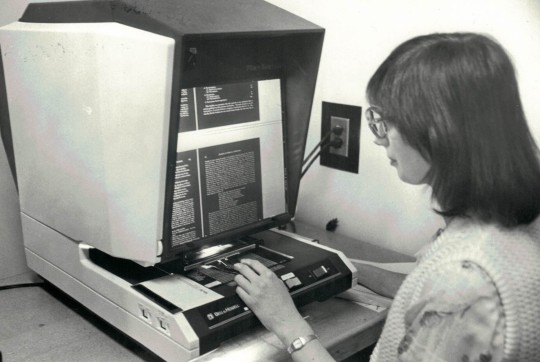
(Photo courtesy of https://digitalcollections.tyndale.ca/handle/20.500.12730/1204)
Secondly, studying in our modern technological age is so dissimilar to the 1990’s when I was doing my genetics undergrad degree at UBC. For my 4th year genetics research paper, I remember being at the library everyday, going through micro-fiche files to find research papers and journals, and spending a lot of time and money, photocopying the articles I needed. At that time, pre-loaded photocopy cards were just coming into existence while manually depositing coins and bills into photocopiers was still the norm. I would write everything down on paper and then type my report on a typewriter or go to a friend’s house to use his computer and printer. These days, with a good internet connection and my laptop, going to school is much more convenient. I can find articles on experiential learning theory with a simple Google search. And being able to tab through different reference articles on my laptop at the same time, is amazing to me and has definitely saved a lot of trees and highlighter pens. Online learning is definitely a trend in adult education that is here to stay and will keep growing as our population of adult learners grows.

(Photo courtesy of https://www.researchgate.net/figure/Photocopy-machine-in-a-library-Source-http-collegiantccdedu-p11588-accessed-on_fig5_322962889)
0 notes
Text
Blog Post #2 - Trends in Adult Education

(Photo courtesy of https://outlet.shop2023onlinesale.ru)
A recent article on LinkedIn by Firdosh Khan, talks about the trends that will shape education in 2024 and beyond.
https://www.linkedin.com/pulse/unlocking-tomorrows-learning-education-trends-shape-2024-firdosh-khan-lcudc/ (December 17, 2023).
The trends he spotlights are technology and the rise of AI-powered learning, the use of Virtual Reality and Augmented Reality systems, micro-learning and lifelong learning as major cornerstones in the evolution of education and lastly, hybrid learning which blends offline and online learning with the rise of micro-credentialing. It’s the subject of micro-credentialing which interests me and how it will impact adult education. Micro-credentialing allows adult learners to have much more flexibility in how and when they learn. Khan states, “Micro-credentialing is experiencing a boom, marking a departure from traditional, lengthy degree programs to shorter, focused learning programs. This shift aligns with the demand for quick, specialized skill acquisition…The popularity of these programs lies in their ability to provide alternative pathways to skill development and career advancement, aligning education more closely with the demands of the rapidly evolving job market. Beyond academic achievement, the focus on student well-being is taking center stage. Recognizing the intricate link between mental health and academic performance, institutions are prioritizing the holistic development of students.”
I can see how micro-credentialing will impact my future teaching career just by looking in my own backyard. Here at VCC, the college is offering micro-credentials in a variety of programs like Small Business Administration, Fashion for Film and Hospitality. https://continuingstudies.vcc.ca/search/publicCourseSearchDetails.do?method=load&courseId=2342815

(Photo courtesy of GETTY/FCAFOTODIGITAL)
In addition to an olive oil specialist course and craft alcohol tourism, George Brown College in Toronto offers a micro-credential program for wedding cake specialist!
To prepare and accommodate for this trend of micro-credentialing, I can see the need to upgrade my skills in areas that I don’t practice regularly or in a diploma program like business administration and entrepreneurship in food operations. In this article by H. Frank McKay, he explains that for teachers to improve themselves, they will need to take high quality micro-credential courses to upgrade their own skills in the future. https://www.rti.org/insights/teacher-learning-systems-need-micro-credentials-move-teachers-and-students-forward Further to the importance of teacher’s owning their own professional development, a paper by Digital Promise (2016) states “The emerging micro-credentialing approach—driven by an agile online system—presents teachers with opportunities to document their formal and informal learning. Individually and in teams, teachers can identify and develop important skills, submit evidence of their competence, and earn digital badges verifying their expertise. School systems can tap the resulting data to inform decision-making about investments in professional learning to most effectively support teaching practice. And in the long run, micro-credentials offer a way for…teachers to more fully own and advance their profession.” https://digitalpromise.org/wp-content/uploads/2016/06/Microcredentials_Driving_teacher_learning_leadership.pdf
In addition to professional development, I think that micro-credentials may provide for schedule flexibility which is advantageous for teachers that wish to teach shorter classes in the evenings or weekends, according to the schedule of their adult students. So down the road, my possibilities for employment may change from teaching a full-time, 10 month baking and pastry program to teaching smaller, specialized part-time courses like puff pastry, or chocolate bon bon production, or wedding cakes.

0 notes
Text
Blog Post #1 – Trends in Your Field
From a blog post by the Auguste Escoffier School of Culinary Arts https://www.escoffier.edu/blog/world-food-drink/what-the-future-of-culinary-education-looks-like/ (August 4, 2022), they list a few trends to look for in culinary education like balancing traditional culinary techniques and innovations in modern technology, focusing on sustainability and local food producers, adding entrepreneurship and business education to the curriculum and increased flexibility in terms of teaching online and making courses available to students globally and on a schedule that meets their needs.
The one trend that most interests me is how online teaching can be incorporated into culinary education, especially with baking and pastry arts. The Escoffier blog post states: “The online culinary curriculum at Escoffier includes live and archive video class sessions, pre-recorded and live cooking demonstrations, reading assignments, cooking theory lessons, and labs with cooking assignments. As long as students meet their weekly program deadlines, they can complete this coursework whenever it’s convenient for them. The success of this teaching method has proven how important it is to adapt to the changing needs of modern students.”

Photo courtesy of (https://www.escoffier.edu/wp-content/uploads/2021/05/Culinary-student-taking-photo-of-sliced-bread-on-phone-768.jpeg)
In my opinion, online learning is a viable option in the culinary industry but the structure of the program and providing detailed instructions via highly produced videos is needed which amounts to a lot of dedicated work and time. Over the past decade, institutions providing online courses like Rouxbe (https://rouxbe.com/) and Le Cordon Bleu (https://www.cordonbleu.edu/online/learning/en) have adjusted and developed their online offerings to provide a full and enriching culinary experience at home. From a more traditional perspective, I believe that certain aspects of online learning can be incorporated into the classroom with video work and having students study videos of certain techniques or recipes before the next day’s lesson. Another positive aspect is the ability for students to reference videos or lessons on their own timeline and schedule which allows for more flexibility in learning.
Interestingly, Chef Sahil Mehta wrote an article on HigherEducationDigest.com https://www.highereducationdigest.com/the-challenges-and-opportunities-in-online-culinary-education/ (August 10.2021) where he highlights the pros and cons of online culinary education. Chef Mehta writes that one of the major cons is “there are concepts specifically associated with the culinary field, such as the smell and taste of food, that cannot be conveyed online. Also, students taking up online culinary education do not get the scope of working in a high-energy and technologically advanced kitchen environment…which speaks of the significance of face-to-face instruction.” He goes on to write that one of the major opportunities is “students…get the scope of watching different videos during their online cooking classes. This further helps them in practising their dish making skills…[and] students get the opportunity to diving into the lessons and learning as per their speed and calibre.”
From a baking and pastry perspective, I agree with Chef Mehta’s assertion that you cannot replicate the experience of taste and smell at home while watching an instructional video and from a taste testing perspective, it is hard to ascertain how successful your attempt to replicate that recipe turns out without your instructor being able to taste your creations. I believe that face to face instruction will always be a major element in a culinary education, even one that includes an online learning component. Aside from working in the kitchen or lab, there are certain elements of the pastry arts that lends itself well to online learning. Specifically, cake decorating skills like gumpaste or sugar flower work can be easily demonstrated and followed, step by step, through online videos and instructions.
instagram
Contemplating my future as a pastry chef instructor, I think that there will always be respect shown for the traditions of French pastry and baking which is best demonstrated through hands-on teaching to students in a laboratory or kitchen setting. While theory and the science of baking is usually discussed in the classroom prior to kitchen work, preparing students with online videos and materials to study, in addition to their textbooks, can contribute to a “flipped” classroom environment where more meaningful learning can occur with the use of small quizzes and games. By utilizing online learning to supplement normal course materials or to enhance learning of more advanced or specialized techniques to complete milestone projects, students will have the chance to learn more than the standard curriculum and enhance their portfolios. Hopefully, with constant feedback from the students, this blend of traditional and modern online techniques can become an encouraging and successful way of teaching and learning in my future classes.
#education#VCC#PIDP 3100#adult education#culinary education#trends in education#online learning#Instagram
0 notes
Text
A Quick Thought on Chapter One: Adult Learning in Today’s World
Having read the first chapter of our textbook, Adult Learning: Linking Theory to Practice (Merriam & Bierema, 2014), the sections on globalization and technology strike a familiar note with me. As a pastry chef and former business owner, I have witnessed firsthand the globalization of our “hyperconnected” world via the internet and how technology has become intrinsic to our society. When my shop first opened in 2003, the internet was barely out of its infancy and cell phones were used to talk to people. For the latest news, one would need to purchase newspapers, listen to the radio or watch tv. And the only way to discover the newest pastry recipes and techniques was to import cookbooks and magazines from France or attend specialty classes at industry demonstrations and events. Over these past 20 years, the advent of smartphones and social media has made informal learning an everyday occurrence as technology becomes more commonplace allowing news and ideas to be shared instantly in a “tweet” or a “gram”.
In today’s pastry world, information is free-flowing and readily available on Google while social media has paved the technological highway in our “hyperconnected” society. By following pastry chefs, bakers and pâtisserie academies from around the world, informal learning provides constant inspiration with the sharing of ideas, recipes, and new techniques. Celebrity pastry chefs like Amaury Guichon (@amauryguichon) and Cedric Grolet (@cedricgrolet) started this trend by sharing eye-popping process videos of their latest delectable creations and chocolate showpieces.
instagram
instagram
Even though these viral videos probably started from a marketing perspective, the proliferation of copycat content producers from all corners of the world has populated the internet with multitudes of informal learning moments. From these small moments of learning, amateur and professionals can be inspired to seek out more formal educational opportunities through online classes like MasterClass (www.masterclass.com) or PastryClass (www.pastryclass.com) or pursuing more hands-on experiences at pastry schools and academies like the Savour Chocolate and Patisserie School (www.savourschool.com.au) in Australia or the Pastry Academy (https://thepastryacademy.com) in Las Vegas. From a business perspective, the use of social media might begin as a marketing tool but can result in the education of potential clients to a pastry chef’s abilities and creations.
0 notes
Text
A little about me...
My name is Peter Fong and most of you will not have heard of me before, but sometime over the past 20 years, you may have tried some of my desserts, cakes or croissants. Prior to enrolling into the PIDP program at VCC, I was the proud owner and pastry chef of Ganache Patisserie in Yaletown. Opening the shop was my vision to “bring a little bit of Paris to Vancouver” and becoming established as one of Vancouver’s premier pastry and wedding cake shops was a dream come true. However, with my lease expiring at the end of October 2023 and the total upheaval in our business due to the Covid-19 pandemic, I decided to close the business and pursue a career in teaching.
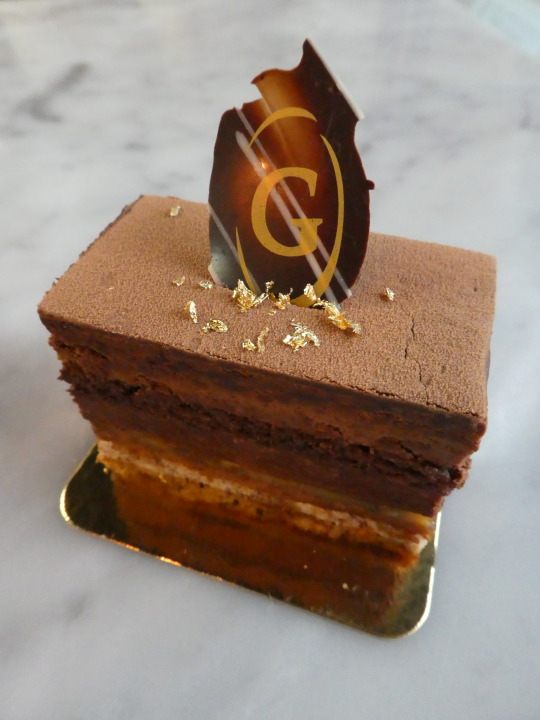
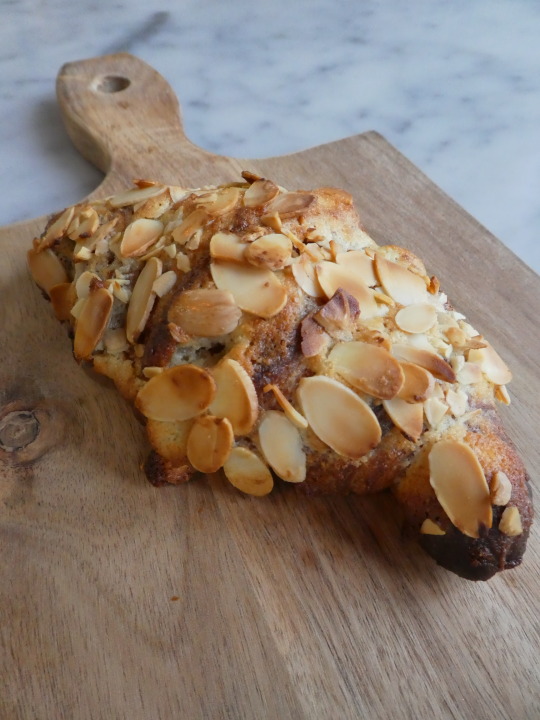
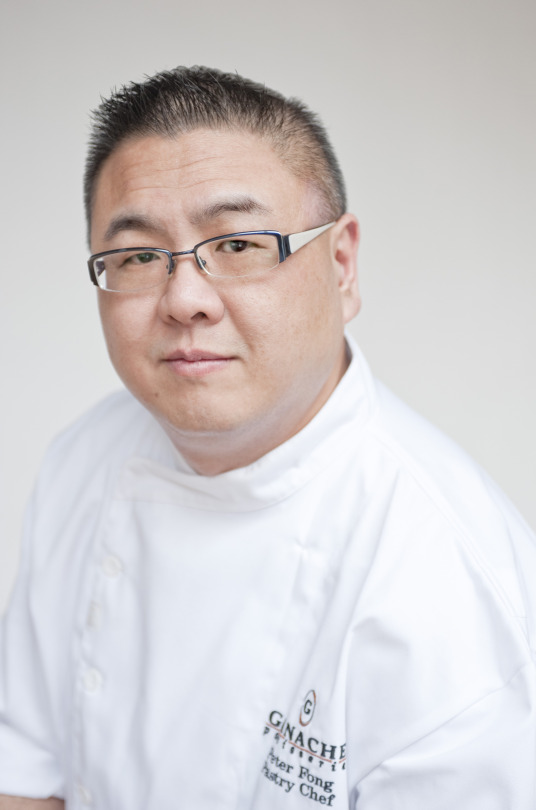

As part of the curriculum of PIDP 3100, this blog will chronicle my journey through the program as we explore andragogy and what it means to be an adult learner. On a more personal level, I will look at my experience in returning to academic studies, differentiating my time as a student at UBC over 30 years ago from my time at culinary school and then my career working as a pastry chef and business owner. And having recently been hired by the Vancouver School Board as a Baker supporting the instructors in secondary school culinary programs, I hope to gain more insight from the beginning of my new career in teaching and education.
2 notes
·
View notes